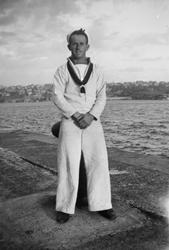 “I must down to the seas again,
to the lonely sea and the sky” ………. Oh yeah, I may mess around with poems about princes
and alternate psychology, failed love and pets I’ve had, but after I’m done
with all that, and I’m bored from being ashore and I’m bored with lubber prose
then I’ve got to breathe salt air and taste the salty sea once more. That’s when I turn to men like John Masefield. And what better poem than Masefield’s Fever
Chills to put me arm in arm again with characters doing their time at sea. This is one of my favourite Masefield poems,
the poor bastard at the bottom of the pecking order in a voice, a language and a
behaviour that is absolutely historical in it’s preservation of how sailors
once thought and talked ………. and hopefully, probably, still do. I believe the 'Chief' in Fever Chills was still in when I was doing my time on Vendetta.
“I must down to the seas again,
to the lonely sea and the sky” ………. Oh yeah, I may mess around with poems about princes
and alternate psychology, failed love and pets I’ve had, but after I’m done
with all that, and I’m bored from being ashore and I’m bored with lubber prose
then I’ve got to breathe salt air and taste the salty sea once more. That’s when I turn to men like John Masefield. And what better poem than Masefield’s Fever
Chills to put me arm in arm again with characters doing their time at sea. This is one of my favourite Masefield poems,
the poor bastard at the bottom of the pecking order in a voice, a language and a
behaviour that is absolutely historical in it’s preservation of how sailors
once thought and talked ………. and hopefully, probably, still do. I believe the 'Chief' in Fever Chills was still in when I was doing my time on Vendetta.
Fever-Chills
(John Masfield 1878 - 1967)
He tottered from the
alleyway with cheeks the colour
of paste,
And shivered a spell
and mopped his brow with a clout
of cotton waste:
“I’ve got a lick of
the fever-chills,” he said, “ ‘n’ my inside it’s
green,
But I’d be as right
as rain,” he said, “if I had some
quinine, --
But there ain’t no
quinine for us poor sailor-men.
“But them there
passengers,” he said, “if they gets
fever-chills,
There’s brimmin’
buckets o’ quinine for them, ‘n’ bulgin’
crates o’ pills,
‘N’ a doctor with
Latin ‘n’ drugs ‘n’ all – enough to sink
a town,
‘N’ they lies quiet
in their blushin’ bunks ‘n’ mops their
gruel down, --
But there ain’t none
‘o them fine ways for us poor
sailor-men.
But the Chief comes
forrard ‘n’ he says, says he, ‘I
gives you a straight tip:
Come none o’ your Cape Horn fever lays aboard o’ this
yer ship.
On wi’ your rags o’
duds, my son, ‘n’ aft, ‘n’ down the
hole:
The best cure known
for fever-chills is shovelling bloody
coal.’
It’s hard, my son,
that’s what it is, for us poor sailor-
men
In this post I’m including two short
pieces from a eulogy I wrote in honour of my grandmother’s youngest brother
(Jimmy Oliver) who died as a prisoner of war in Sandakan ,
Borneo in 1945. Jimmy was with the Australian 8th
Division, 2/10th Field Regiment, sent to Malaya in 1941 to safeguard
Singapore Canberra Brisbane , embarkation, soldiering in Malaya and the
retreat and final surrender in Singapore Singapore
“Tranquil you
lie,
Your knightly virtue proved,
Your memory hallowed,
In the land you loved.”
……..Memorial to 2/10
Field Regiment, Brisbane
1941, Thursday, 20th February A
greaser from the troop ship Queen Mary was found drowned in Singapore
E
staggered from the Horse Guard Bar
with
two of his new found mates,
spat in
the gutter and crudely yelled, up the AIF
I gotta
get back to the Queen e says,
for
Mary’s me home and bed,
so they
turned him to port and held up his head
til his
eyes stopped lolling about,
then
they let him loose and he teetered and rolled
the way
that a sailor would,
you’re
a greaser they yelled, a greaser from hell,
you’re
a bad and evil man,
and the
greaser rolled into the night as happy as he could be
in the
morning they fished a body out
from
the harbour of Singapore
it were
Charlie Smith the greaser were he,
and e drank in the Horse Guard
Bar.
1942, 2nd to 8th February. The
Japanese subjected the 22nd Brigade area to an intense artillery
barrage.
We
cowers and our morale is low,
but we’d
be alright
if
supply could get us more ammo,
them
Japs, they
got
plenty of ammo, too right,
and
they hides and hurls their projies on us
all day
and at night,
but
there ain’t ammunition enough
for
Aussie artillery use.
Sarge
from ‘is briefing says,
ration
the ammo some more,
twelve
rounds a day each gun,
to fire
at the Japs in Johore,
it’s
tough, I know,
but if
you’d pull your heads from your backsides,
you’d
be better gunners, and find,
it
ain’t ammo on what you’s rely,
but there ain’t ammunition enough
for Aussie artillery use.




